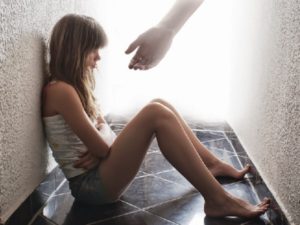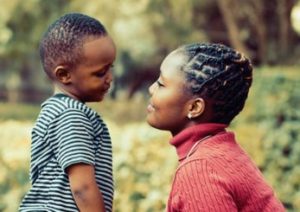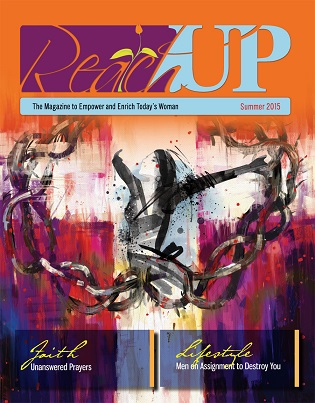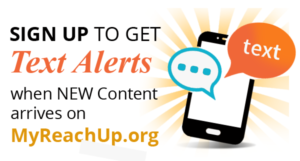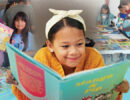Listen Now
Our Spring 2015 issue featured the informative article, “Abuse Happens,” which helped us understand the cycle of domestic abuse towards the adult woman and how to get free.
In this issue, Tierra Davidson gives you tips on how to recognize and help a child who has been or is currently in an abusive situation. These pointers come from her personal experience of years of abuse by family members when she was a child. Her story of personal and spiritual victory was featured in our Summer 2009 issue. She is turning her pain into gain.
It’s a lie that adults are unable to help an abused child. But you may wonder, How can I help?
There are actually many things that help abused kids, and you may be surprised at how easy some of them may be.
- If you are a relative of the child, watch for possible signs of abuse such as: Wearing baggy clothes, fearfully shying away from certain people, a drastic change in mood or coping skills, self-injury, etc. Become as aware of this as possible.
- If you are the relative/guardian, do not make the child go see or spend time with someone he or she seems to dread or fear. Sadly, most child abuse is done by a person the child trusts most. I like to say, “They get lured in.” We must be very observant. Plus, the feared person may not be of the opposite sex, so please don’t dismiss a concern due to that.
- If you are a relative or even have a connection with the child, try to help the child have a basic knowledge of what abuse is. You don’t need to be too descriptive. But I’d suggest using a doll to help the child understand.
 If they know what abuse is, they will be more likely to tell. Let them know what behavior is wrong, and that it is very important to tell you. Always assure the child that he or she won’t get in trouble by telling you.Don’t shield your children from this topic. Abuse is real, and your child could be a victim someday, though we hope and pray not. But all children are at risk in one way or another. The more abuse is discussed on a age-related level, the more likely a child will feel safe to talk with you about. If abusers are going to threaten them to be silent, shouldn’t we be pro-active and warn them, and give our children confidence and strength to defend themselves? They need to know and feel that their voice matters!
If they know what abuse is, they will be more likely to tell. Let them know what behavior is wrong, and that it is very important to tell you. Always assure the child that he or she won’t get in trouble by telling you.Don’t shield your children from this topic. Abuse is real, and your child could be a victim someday, though we hope and pray not. But all children are at risk in one way or another. The more abuse is discussed on a age-related level, the more likely a child will feel safe to talk with you about. If abusers are going to threaten them to be silent, shouldn’t we be pro-active and warn them, and give our children confidence and strength to defend themselves? They need to know and feel that their voice matters!
- No matter who you are to the child, help begins by becoming a child’s friend. Playing with the child and being enthusiastic seems to draw a child’s attention and build trust. Being a person the child can trust will allow the little one to confide in you or even just to be themself around you. That will help you see signs of abuse if they exist.
- It may be an old rule, but it’s still true. Encourage children not to talk to strangers. You know why.
- If the child tries to talk to you, please don’t push them away even if you’re busy. Children don’t understand those manners yet, and they will say things when it’s bad timing or not even appropriate. They don’t always plan a time to talk to you about what bothers them. But the important message here is they need to be heard. If they lose the chance to speak, they may not try another time. So it’s important to be alert and give them your time.
 If the child reveals the abuse to you, it’s important to not react outwardly. Of course, you may be steaming with so many emotions. But the child does not need to see that. Seeing those raw emotions can give misleading thoughts to the child such as, I made them mad, I shouldn’t have told, or This is all my fault. Your emotional reaction may lead the child to think you are mad at him or her. Or they may think, I wish I was invisible or I wish I was dead. Instead, act calm and supportive on the outside. Rather than focusing on the person who did the abuse, keep your attention on the child. Look at and focus on the child who needs comforting instead of thinking about your anger. Let him or her know that telling you was a good thing. Also, keep telling the child it is not his or her fault. Saying it one time won’t do it, believe me.Personally, I believe that what happens right after telling is the crucial point that determines which direction in healing the child will go. Let’s try to prevent or lessen the amount of lies the child will have to work through.
If the child reveals the abuse to you, it’s important to not react outwardly. Of course, you may be steaming with so many emotions. But the child does not need to see that. Seeing those raw emotions can give misleading thoughts to the child such as, I made them mad, I shouldn’t have told, or This is all my fault. Your emotional reaction may lead the child to think you are mad at him or her. Or they may think, I wish I was invisible or I wish I was dead. Instead, act calm and supportive on the outside. Rather than focusing on the person who did the abuse, keep your attention on the child. Look at and focus on the child who needs comforting instead of thinking about your anger. Let him or her know that telling you was a good thing. Also, keep telling the child it is not his or her fault. Saying it one time won’t do it, believe me.Personally, I believe that what happens right after telling is the crucial point that determines which direction in healing the child will go. Let’s try to prevent or lessen the amount of lies the child will have to work through.
- The biggest thing we can all do to help a child of abuse is to pray. Some think, How will praying help those being abused? Let me tell you! God is the One who put everything in place for my freedom to happen. I was an adult when it ended, but God is not limited. God can move mountains! He can remove any obstacle. God saves and because of that, praying for hurting, abused children is powerful.
The children need us. The children need you. Please let us be in unity and not allow children to fight alone if we can stop it.
Children are not an inconvenience but rather are little human beings who got slammed with the darkness in their once bright lives.
Three words sum this up: OPEN OUR HEARTS.


